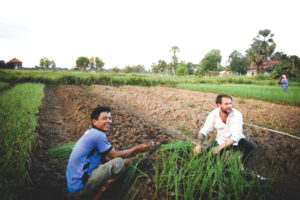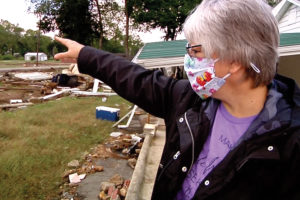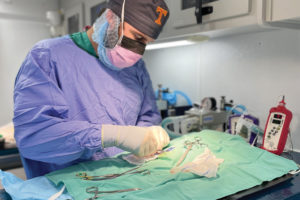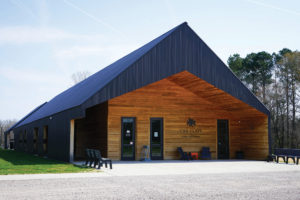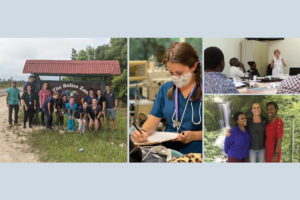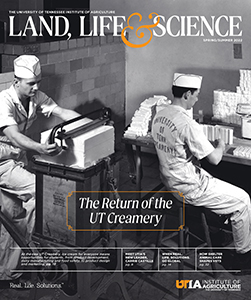
Four efforts focus on emerging challenges in agriculture and natural resources
A dedicated and engaged committee of AgResearch faculty and staff, along with a professional consultant, worked throughout 2020 to develop a framework for future research to support the overall priorities of the Institute’s strategic plan: driving innovation, expanding real-life learning, strengthening and diversifying resources, and improving Institute effectiveness. The committee’s work, which was coordinated by Associate Dean Tim Rials, resulted in the AgResearch Strategic Action Plan (ASAP), a three-year effort dedicated to addressing today’s increasingly complex research challenges. It is available online at tiny.utk.edu/ASAP. The four-pronged approach includes:
- Balancing the unit’s research portfolio with
- integrated, transdisciplinary programs
- Cultivating a team approach to complex problems
- Advancing concepts with structured support
- Ensuring research and development capacity with targeted investment
ASAP includes a commitment to support new faculty initiatives through a targeted investment of approximately $1 million in research capacity, which progresses through several stages of development. Implementation of the three-year plan began in January 2021. In this first stage AgResearch administration invested $824,000 in instrumentation grants to increase the abilities of UTIA researchers to perform cutting-edge discovery and innovation. The improved research equipment and tools are also expected to better position AgResearch faculty in competing for federal grants.
The next phase of the plan involves developing research teams to address complex research problems. Called the ASAP SPRINT program, which stands for Strategic Planning Research Initiatives, a committee of reviewers accepted eighteen competitive internal proposals from which four were selected for further funding after external review. The programs involve researchers from every department, as well as scientists from across the University of Tennessee, Knoxville; Oak Ridge National Laboratory; and several southeastern universities.
An investment of $700,000 over two years will assist the teams in conducting preliminary experiments and pursuing additional grant funding, as well as new partners.
AgResearch Dean Hongwei Xin says, “I’m excited to add these projects to our research and development portfolio and watch as these tightly integrated teams contribute solutions to challenging topics. I fully expect that new partners and additional resources will build on our investment to create long-term impacts, yielding appreciable returns on the investment.”
The inaugural SPRINT awards support research that will support a broad swath of emerging issues in livestock and crop production, as well as concerns involving climate change, water quality, and energy availability. The interdisciplinary research projects include:
Precision Livestock Farming: Investing for Future Success
Research will involve creating a database for managing livestock on the UT AgResearch and Education Centers; surveying livestock and broiler producers; developing a computer vision system to monitor beef cattle respiration and body condition; implementing a robotic system for real-time monitoring of poultry behavior and assessment of their well-being; quantifying the economic potential of automated milking; and incorporating the findings into UT Extension programs. The Precision Livestock Farming Team is led by Robert Burns, distinguished professor in the Department of Biosystems Engineering and Soil Science.
Advancing Innovation in Renewable Carbon Aviation Fuel Technologies (AIRCRAFT)
The AIRCRAFT program outlines a project to create sustainable aviation fuel (SAF) and coproducts. AIRCRAFT’s three research thrusts are to develop innovative fractionation and conversion technologies for sustainable aircraft fuel production; to identify coproducts; and conduct a sustainability analysis. Additionally, AIRCRAFT will develop training for the diverse future workforce while working to engage industry partners in the region. The program is led by Nourredine Abdoulmoumine, assistant professor in the Department of Biosystems Engineering and Soil Science.
Impact of Micro- and Nanoplastic Pollution from Agricultural Plastics in Soils, Nearby Waterways, and their Related Ecosystems
The overall goal of this project is to determine the fate, impact, and transport-related behavior of micro- and nanoplastics (MNPs) at critical interfaces between soil and groundwater and waterways, such as streams on farms. The team plans to prepare major proposals and publish seminal review articles that address long-term goals, including finding “hotspots” for micro- and nanoplastic pollution accumulation and developing strategies to mitigate them. The team is led by Doug Hayes, Institute Professor, and Sean Schaeffer, associate professor, in the Department of Biosystems Engineering and Soil Science.
Improving Energy Efficiency, Crop Yield, Nutritional Quality, and Resiliency of Nationwide Food System through Controlled Environment Agriculture in the Mid-South
This project is focused on improving the energy efficiency of controlled-environment agriculture production for small- and medium-sized farms. Research will focus on optimizing environmental and cultural variables and inputs to improve crop yield; evaluating and implementing alternative renewable energy sources, including solar; and determining consumer perceptions and willingness to pay for premium plants produced in controlled-environment agriculture. The team is led by Carl Sams, Institute Professor and Austin Distinguished Professor in the Department of Plant Sciences.
Rials says plans are underway for the next SPRINT grant cycle to identify additional priorities where AgResearch scientists can add value.
The goals of ASAP are lofty. The SPRINT efforts are ambitious. Success promises to improve the quality of life of all Tennesseans and others throughout the region and beyond.
Explore More on
Features
MORE FROM THIS ISSUE



